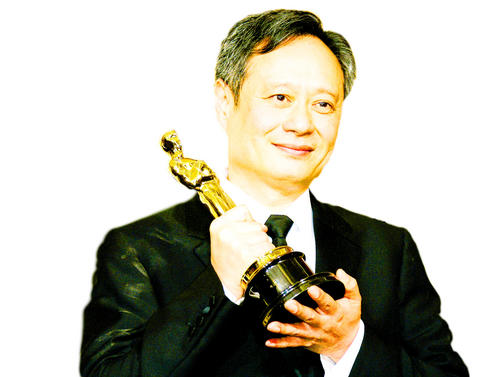Ang Lee(李安), Taiwan's pride and joy, expressed great disappointment with the local media after his long awaited espionage thriller, Lust, Caution (色戒), premiered at Cannes last week. The Oscar-winning director was miffed that the front-page reports of major print media focused only on the full-frontal nudity of Tony Leung (梁朝偉) and his provocative sex scene with Chinese actress Tang Wei (湯唯).
Admitting he almost had a nervous breakdown shooting the film's steamy sections, Lee said it was his duty to guide the actors through "hell," and this helped him make it through the testing scenes. He applauded both Leung and Tang for their exceptional performances.
To Fanny of the voluptuous girl outfit F4, however, the nudity in Lust, Caution doesn't seem that big of a deal. Against her agent's advice, the singer who "always talks craps" (in the words of her agent) walked up the red carpet at Cannes to see Lee Kang-sheng's (李康生) Just in Love (幫幫我,愛神).

Photo: Taipei Times
When asked what she thought of the sex scenes in Ang Lee's work, Fanny said Just in Love had just as much to offer because "Lee Kang-sheng also has his three points exposed," Chinese-language media reported.
Local singer-turned-high society dame Zhang Qing-fang (張清芳) returned to Taiwan from Hong Kong to celebrate her 41st birthday and threw a party for her 100-day-old son. With a husband whose assets are reportedly worth over NT$1 billion, Zhang's party was grand and attended by entrepreneur celebrities Terry Gou (郭台銘), Taishin Financial chairman Thomas Wu (吳東亮) and Acer Group founder Stan Shih (施振榮).
However, the husband, father and investment banker Sung Hsueh-jen (宋學仁) is a man repulsed by the limelight. Spotted by local media leaving the party last weekend, the 54-year-old banker ran back to the hotel at a lightening speed while reportedly shouting "Help! Guard, guard! Catch them!"

Photo: Taipei Times
Pop stop has to hand it to Sung since one has to be a resourceful businessman like him to come up with an innovative way to ditch the paparazzi in a split second.
On a more somber note, Hong Kong's megastar-turned-housewife Cherie Cheung (鍾楚紅) lost the love of her life when her husband of 16 years, the advertising genius Mike Chu (朱家鼎), died of cancer last week. The former sex goddess married Chu at the height of her career in 1991 and shocked the Chinese-speaking world by giving up the glitz and glamour of stardom for family life. Since her marriage she shunned the spotlight.
It is sad that death has parted the devoted couple, but fans of the 47-year-old star may see their beloved diva return to the big screen. According to Chinese-language media, Hong Kong director Tsui Hark (徐克) already has a project lined up for Cheung and megastar Chow Yun-fat (周潤發) has also called up his Hollywood friends to pave the way for the international comeback of his old friend.
All they wait for is a "yes" from the grief-stricken widow whose dream was said to be a carefree life with her beloved husband at their holiday resort, which is under construction in Bali, Indonesia.

Behind a car repair business on a nondescript Thai street are the cherished pets of a rising TikTok animal influencer: two lions and a 200-kilogram lion-tiger hybrid called “Big George.” Lion ownership is legal in Thailand, and Tharnuwarht Plengkemratch is an enthusiastic advocate, posting updates on his feline companions to nearly three million followers. “They’re playful and affectionate, just like dogs or cats,” he said from inside their cage complex at his home in the northern city of Chiang Mai. Thailand’s captive lion population has exploded in recent years, with nearly 500 registered in zoos, breeding farms, petting cafes and homes. Experts warn the

No one saw it coming. Everyone — including the Chinese Nationalist Party (KMT) — expected at least some of the recall campaigns against 24 of its lawmakers and Hsinchu Mayor Ann Kao (高虹安) to succeed. Underground gamblers reportedly expected between five and eight lawmakers to lose their jobs. All of this analysis made sense, but contained a fatal flaw. The record of the recall campaigns, the collapse of the KMT-led recalls, and polling data all pointed to enthusiastic high turnout in support of the recall campaigns, and that those against the recalls were unenthusiastic and far less likely to vote. That

The unexpected collapse of the recall campaigns is being viewed through many lenses, most of them skewed and self-absorbed. The international media unsurprisingly focuses on what they perceive as the message that Taiwanese voters were sending in the failure of the mass recall, especially to China, the US and to friendly Western nations. This made some sense prior to early last month. One of the main arguments used by recall campaigners for recalling Chinese Nationalist Party (KMT) lawmakers was that they were too pro-China, and by extension not to be trusted with defending the nation. Also by extension, that argument could be

Aug. 4 to Aug. 10 When Coca-Cola finally pushed its way into Taiwan’s market in 1968, it allegedly vowed to wipe out its major domestic rival Hey Song within five years. But Hey Song, which began as a manual operation in a family cow shed in 1925, had proven its resilience, surviving numerous setbacks — including the loss of autonomy and nearly all its assets due to the Japanese colonial government’s wartime economic policy. By the 1960s, Hey Song had risen to the top of Taiwan’s beverage industry. This success was driven not only by president Chang Wen-chi’s